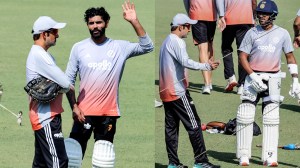When Afghans vote on Oct 9, India will leave an indelible mark
In Afghanistan’s first ever Presidential elections due on October 9, the credit for providing what an independent research group descri...

In Afghanistan’s first ever Presidential elections due on October 9, the credit for providing what an independent research group describes as ‘‘the last line of defence against fraud’’ goes entirely to India.
The reference by the Afghanistan Research and Evaluation Unit (AREU) is to the black indelible ink that will mark the left thumb cuticle of every Afghan, from among the over 10.6 million people, eligible to vote in what is undoubtedly a trail-blazing exercise in democracy. Around a million more will also vote in refugee camps in Pakistan and Iran.
And, if the full-colour ballot papers listing the 18 presidential candidates, including interim President Hamid Karzai, are being supplied by Canada and the ballot-boxes by Denmark, the all-important indelible ink, manufactured by Mysore Paints and Varnish Ltd, is a gift from India.
‘‘The ink will be one of the most important components in the electoral exercise since it will ensure that nobody votes twice,’’ said S K Mendiratta, one of the five international members on the 11-member Joint Electoral Management Body (JEMB), Afghanistan’s UN-backed Election Commission. The other five foreign members are from the US, Sweden, Spain and Indonesia.
Though the ink is the same as used in India’s Parliamentary elections, it is packaged differently to ensure easier handling. It comes in around 50,000 marker pens that will be supplied to nearly 20,000 polling stations across the country. ‘‘Once it’s on the cuticle, it’s impossible to take it off,’’ said Jon Sifton of Human Rights Watch, displaying the left thumb he got marked at the JEMB. ‘‘This is pretty good stuff.’’
All the attention being paid to the ink is primarily because of fears of massive fraud in the elections, since away from Kabul, warlords and tribal chiefs still continue to call the shots. According to the AREU, there has been significant over-registration of voters in 13 of Afghanistan’s 34 provinces.
The voter registration cards carry photographs, but women have the choice to do without them. So multiple cards are said to be especially common among women. People will be free to vote atany polling station, since there will be no voters’ lists. But the voter registration card will be punched once the vote is cast.
Many people have taken out multiple cards because any government document in Afghanistan has a resale price. Fahima, a cook, for instance, has ten cards, although she does not plan to vote. She claims to have sold two of her cards for Rs 2,400 each, more than her monthly wage.
The responsibility for ensuring that the electoral process is free and fair vests on an Indian K J Rao who, like Mendiratta, is a retired official of India’s Election Commission— both are now re-employed as EC advisors. ‘‘The number of complaints so far have been very few, but I did investigate a case of multiple female cards issued in central Afghanistan and found there was malpractice,’’ said Rao, who is in charge of electoral investigation and enforcement for the whole country.
‘‘One unique aspect of the Afghanistan election is that government servants are permitted to openly campaign outside office hours,’’ he said. ‘‘That makes my job easier (since one main source of possible electoral misconduct won’t count).’’
There is one other former EC official, Thomas Mathew, who is also playing a significant role in the Afghan elections. He is in charge of elections in the Hazara-dominated central highlands of Bamiyan, where the Taliban destroyed two standing Buddhas.
The conduct of the elections is a daunting challenge for the JEMB. Besides the threat of violence from warlords and members of the deposed Taliban regime, the entire opertion appears an audacious gamble in a country with low literacy, non-existent roads, poor communications, and no tradition of electoral democracy.
‘‘Let there be bomb attacks, but we will go and vote,’’ said taxi-driver Mohammed Ismail, as a Bollywood song reverberated through his cab. ‘‘There are only two choices now — democracy or back to gun rule’’.
The JEMB has to recruit around 100,000 polling officials, at least a quarter of them educated. So unlike in India, many of the officials would have to be private citizens. After the voting, the ballot boxes will be brought to eight regional centres for counting, and the result will be known only around the end of October. If no candidate gets 50 per cent or more of the votes in the first round, there will be a run-off between the two leading contenders in early December.
Afghanistan’s momentous presidential polls will however go largely unobserved by international experts. Due to fears about security, even the European Union has decided not to appoint a full-fledged observer mission. But the newly set-up Free and Fair Election Foundation of Afghanistan is busy training around 3,000 Afghans to act as election observers. They might be assisted by a few independent foreign observers willing to take the risk.
‘‘Just like in Bihar, in remote areas here we may not get to know what actually went on,’’ said Mendiratta. ‘‘But by and large, things should go alright. All arrangements are getting into place. The only real concern is security.’’





- 01
- 02
- 03
- 04
- 05


























